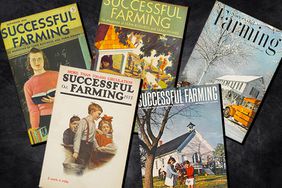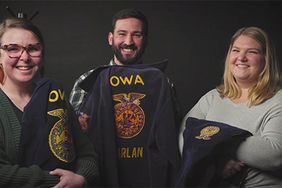:max_bytes(150000):strip_icc()/Chemistry20in20the20field-2-2000-d1549c526975469eb0bb4df5eeda6974.jpg)
On Lone Oaks Farm, University of Tennessee Extension is creating an example of a multiuse agricultural educational camp, conference center, and event site that goes well beyond just the needs of 4-H members to include the education of nonfarm students and the public at large.
The 1,200-acre farm was officially opened as a public entity in 2017 and sits amid a valley of beautifully designed rolling pastures, crop plots, timber, trails, waterways, and ponds 75 miles east of Memphis, near Middleton. Lone Oaks Farm has already played host to thousands of the region's students in west Tennessee in addition to 4-H members.
Over the past three years, library media specialist Deana Sain, of Bolivar Middle School, has taken hundreds of students to Lone Oaks on daylong field trips.
"Many of these students have no farm experience whatsoever," says Sain. "They were able to walk in the woods, which many of them had never done. Many saw chickens for the first time and saw how they laid eggs. These are simple but profound experiences for them. It was life-changing."
Focus on STEM
Most of the emphasis of the education at the farm is STEM-based, that is, it involves science, technology, engineering, and mathematics. Among other things, the seventh and eighth graders used a demonstration cotton field to try to determine how much cotton in the field was actually needed to make one of the Lone Oaks Farm T-shirts.
Though challenging, the students did the math, took the measurements, and determined that 3 row-feet of cotton was needed to make the shirt. The students also produced a video explaining the process they used to determine the answer.
Future projects will hopefully involve the use of equipment such as drones – and maybe even a 3-D printer (Sain and others have collaborated on the grants). That prospect has raised the excitement level for trips to Lone Oaks even higher, according to Sain.
As Ben West sees it, Lone Oaks Farm is only beginning to tap what will happen here. The western region director for the University of Tennessee Extension, West oversees the operation of Lone Oaks and was part of the team who helped the state decide to purchase the property.
The farm already hosts corporate retreats, family reunions, and weddings, as well as 4-H and other students. Over the long term, according to West, there are plans to add a STEM youth education facility, enough cabin space for 200 to 300 students, and a dining center.
Admittedly, what they now have vs. what is planned is ambitious. But those ambitions were fueled by the turnkey operation with which they started.
"I'll never forget the day in 2014 when Tim Smith came into my office, all out of breath, talking about this unbelievable place, Lone Oaks Farm, that was for sale and that he'd just toured," says West. Smith was one of a number of Extension people West had tasked to be on the lookout for a site that could take the place of the region's previous 4-H camp, which closed in 2009.
The catch? Lone Oaks Farm was for sale for $24 million.
"I just laughed," says West. "There's no way the state is going to spend $24 million for this." Likewise, University of Tennessee officials in Knoxville also pooh-poohed the notion the state would or could buy such an expensive property.
Still, the farm was kept on the list of possible sites, and in the months to come, the selection committee visited it along with two other possible locations.
"Lone Oaks Farm was head and shoulders above the rest on the wish list," acknowledges West.
A developed property
The farm had been owned for nearly two decades by well-known Memphis developer and property manager Scott Ledbetter. He and his wife, Kathy, had poured their heart and soul – as well an estimated $30 million-plus into Lone Oaks. They were involved in the design of its tracts, the creation of roads, the building of residences and buildings, maintaining ponds and waterways, while developing a highly regarded 500-head Angus herd.
When the Ledbetters realized the state was interested in creating a new camp and learning farm, they made a deal. The couple agreed to a sale price equal to the value set by an appraiser, according to West. The Ledbetters did this knowing that the number set by an appraisal would be less than what they were asking. That's because the farm was so unique, developed, and large that there were no comparable properties.
When the appraiser's value came with a value of $15.9 million, the state agreed to foot that bill if future development or building on Lone Oaks would be accomplished via Extension's regular budget – or through additional fund-raising efforts. Fortunately, Lone Oaks Farm came with considerable ready-to-use assets: 13 residences, 13 lakes and ponds (excellent fishing), 20 miles of trails, and a deluxe cattle sale barn adorned with one of the country's largest collections of vintage hand tools. The cattle, hay, and timber operations continue, with additional crop demonstrations, aquaculture, a shooting range, and an educational STEM facility planned.
"We know that kids get excited about STEM when they have hands-on experiences," says West. "We want to be able to use this working farm as a way to connect people to nature and the outdoors – and to agriculture," says West.







